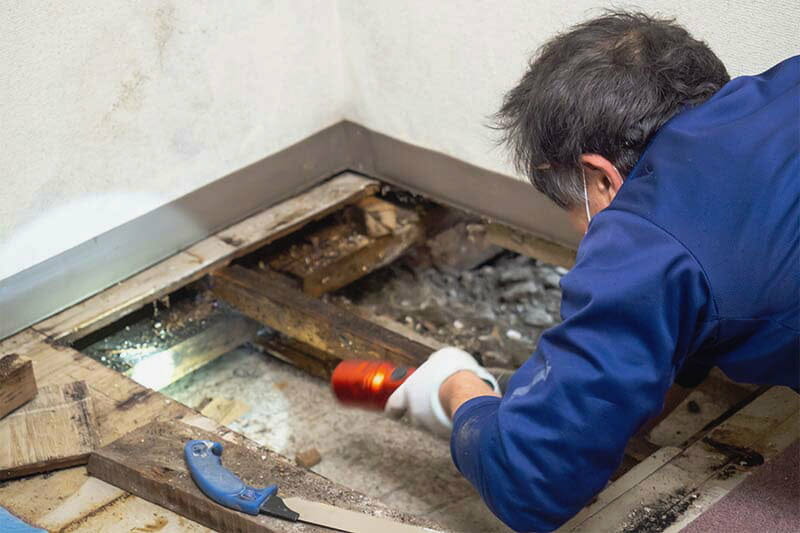Landlords need to understand the significance of their duty when occupants notify them about mold in rental properties, whether these homes are newly built or have been around for a while.
Massachusetts doesn’t have any laws that specifically address mold prevention and remediation as a landlord’s duty or liability.
This article will try to help landlords and tenants to get familiar with rights in obligations due to mold in Massachusetts.
What we cover
ToggleLandlord responsibilities for mold in Massachusetts

A landlord must provide the tenant with habitable premises and common areas for the entire tenancy in accordance with the minimum standard of the State Sanitary Code, which requires protecting the health, safety, and well-being of the tenants and members of his/her family and guests.
The landlord must maintain the foundation, floors, walls, doors, windows, ceilings, roof, stairwells, porches, chimneys, and all structural elements to exclude wind, rain and snow, which can lead to mold growth. In short, the rental unit must be in good repair and fit for human habitation at all times.
You can find a full resource list of mold laws by state here.
Special mold requirements in Massachusetts
The State Sanitary Code says that the apartment can’t have excess moisture. Also, there is a level of proof needed for any case, and the level of proof differs greatly for personal injury from mold compared to basic conditions claims related to the sanitary code. The personal injury requires proving that the mold injured the tenant.
The following steps are required for every single case when mold injuries are claimed by the tenant.
Step 1
The tenant must test the premises to be sure what type of mold is present in the apartment.
Step 2
When you find out what type of mold is in the apartment, the tenants must be tested themselves and be known to have an allergy to that particular type of mold.
Step 3
There must be a clear causal connection to how the mold caused the harm.
Step 4
There must be expert testimony in-person, otherwise, it’s hearsay.
Mold disclosure laws in Massachusetts
Landlords in Massachusetts who rent or sell properties do not have to voluntarily disclose defects and anomalies like mold infestation, termites, or water leaks.
Massachusetts law places a higher burden on real estate professionals, agents, and brokers. The consumer protection act requires such professionals to voluntarily disclose any fact that may influence the tenant not to purchase the agreement.
If the landlord tells the real estate agent that there is a water leak on the property that has potentially caused mold growth, the real estate agent must reveal that information to prospective tenants.
How long does the landlord have to fix the problem in Massachusetts?
Landlords in Massachusetts must begin to make needed repairs within five days after receiving notice and must complete them within fourteen days. Also, the landlord can contract with a third party to make repairs within five days after receiving the notice.
The landlord must “substantially complete the repairs” within fourteen days after notice. All told if you correctly document whatever the problem you face is and correctly notify your landlord then you should have a fix within no more than two weeks.
Can you break a rental lease in Massachusetts due to mold?
According to the regulations of the state of Massachusetts, a tenant can break a rental lease because of mold only if the mold problem has made the apartment uninhabitable.
If the tenant is sure that he lives surrounded by mold then the landlord must solve the problem. Depending on the situation, the law may be on the tenant’s side if he/she wants to break the lease earlier if the landlord won’t deal with the problem.
What options to consider before breaking the lease?
Breaking the lease should always be the last option. First, talk to your landlord and ask for professional help to deal with the mold. You can pay for the mold clean-up and later deduct the expenses from the rent or consider withholding the rent until the landlord addresses the problem.
On the other hand, if the lease is ending soon and the mold is not severe then you don’t have to renew anyway you are leaving.
How can a tenant amnesty themselves from mold-related liability?
There are a lot of situations where landlords blame tenants for a mold problem. Let’s dig deeper into this…
Legally, the tenant is not allowed to repair and deduct, withhold rent, or break the lease if he/she has caused the mold problem. The tenant must immediately report spills and leaks to the landlord and even the smallest signs of mold in the apartment before it becomes a serious problem.
It is best to communicate with your landlord in writing because that way you can keep a record of any conversation you have with the landlord about the mold problem. Also, be sure to take photos of mold infestation with time-date stamps.
Can I sue for mold in Massachusetts?
Yes. You can seek justice in court for mold-related problems. There are a few circumstances under which the tenant can sue the landlord for mold:
- If the landlord is informed about visible mold and water leaks but neglected to fix or remediate them;
- If you have lost wages due to your condition because of mold exposure;
- If you have incurred any costs if remediate mold on your own;
- For mold-related damages to your personal property;
Tenant relocation due to mold in Massachusetts
The tenant needs to be relocated if the mold is serious enough to cause the dwelling to be uninhabitable. In cases like this, the landlords are required to remediate the mold at their expense, unless the mold is caused by the tenant.
Depending on the lease terms and laws of the applicable jurisdiction, it is determined who will bear the costs of eventual relocation.












